- Home
- Elizabeth George
I, Richard Page 2
I, Richard Read online
Page 2
They would see this monument to days gone by—not to mention to propriety—in a few hours, after a rather long drive across the countryside.
They were to meet that morning after breakfast at the Queen's
Gate, which gave way to Garrett Hostel Lane, at the end of which their mini-coach would be waiting for them. It was here, where the assembled students picked up their sack lunches and browsed through them with the usual complaints about institutional food, that they were finally joined by a subdued Sam Cleary and a miserable-looking Frances.
If clothes made a statement about the outcome of their wee-hours discord, Sam had clearly emerged the winner: dapper as always in a trim sports jacket, with his bow tie cleverly complementing the forest green highlights in his tweed trousers. Frances, on the other hand, was dowdiness incarnate in a drab, too-large tunic and a matching too-large pair of trousers. She looked like a refugee from the Cultural Revolution.
Polly seemed eager to mend whatever breach she might have caused between the professor and his wife. After all, she was nearly fifty years Sam's junior and a girl with a boyfriend back home in Chicago to boot. She might have enjoyed the attentions of an older man—a really older man, as she would have put it— in the college pub for several nights running, but that was not to say that she would ever have considered fanning the flames of Sam's interest to build to something more. True, he was extremely nice looking with all that gray hair and that blush of good health on his cheeks. But there was no way around the fact that he was also old, and he couldn't compare to Polly's own David despite David's so far unshakable and somewhat obsessive interest in developing a career studying howler monkeys.
Polly called out a cheerful good morning to the Clearys and motioned to them with her camera. She'd put on an enormous telephoto lens for their outing, which served her purposes well at the moment. She could take the picture she wanted of Sam and his wife while keeping her distance from them. She said, “Stay right there by the herbaceous border. The colours are sensational with your hair, Frances.”
Frances's hair was gray. Not that stunning white that some women are blessed with but battleship gray. She had a lot of it, which was fortunate, but the dullness of its colour made her look dour at even her best moments. And this not being one of her best moments, she looked pretty much the worse for wear.
“Amazing what lack of sleep can do to one, isn't it?” Noreen Tucker murmured with great meaning as the Clearys approached the rest of the students after posing cooperatively—at least on Sam's part—for Polly's picture. “Ralph, you haven't forgotten your nuts and chews, have you, sweetie? We don't want any crises in the hallowed halls of Abinger Manor this morning.”
Ralph's answer comprised a downward motion with his thumb in the direction of his waist. This was easily interpretable: The plastic bag in which he kept his trail mix was pluming out of his safari jacket like the tail of an infant marsupial.
“If you feel the shakes coming, you have a handful of that right away,” Noreen instructed him. “No waiting around for permission from someone, you hear me, Ralph?”
“Will do, will do.” Ralph meandered over to the lunch bags next to the Queen's Gate and huffed his way down to pick two of them out of the wicker basket.
“That guy'll be lucky to make it to sixty,” Cleve Houghton said to Howard Breen. “And what're you doing to take care of yourself?”
“Showering only with friends,” Howard replied.
They were joined then by Victoria Wilder-Scott, who steamed in their direction in her khaki and madras with her glasses perched on the top of her head and a three-ring binder clutched to her bony chest. She squinted at her students as if perplexed by the fact that they were out of focus. A moment later, she realised why.
She said, “Oops, the specs! Right, then,” and lowered them to her nose as she continued breezily. “You've all read your brochures, I trust? And the second chapter in Great Houses of the British Isles? So we're all perfectly clear on what we're going to see at Abinger Manor? That marvelous collection of Meissen that you saw in your textbook. The finest in England. The paintings by Gainsborough, Le Brun, Turner, Constable, and Reynolds. That lovely piece by Whistler. The Holbein. The rococo silver. Some remarkable furniture. The Italian sculptures. All those wonderful period clothes. The gardens are exquisite, by the way: They rival Sissinghurst. And the park… Well, we won't have time to see all of it, but we'll do our best. You have your notebooks? Your cameras?”
“Polly has hers,” Noreen pointed out. “I believe that makes any others redundant.”
Victoria blinked in the direction of their class historian. From the first, she'd made no secret of the fact that she approved of Polly's zeal, and she only wished more of her students were willing to throw themselves into the Cambridge experience in like manner. To Victoria, that was the trouble with agreeing to teach these summer sessions in the first place: They were generally flooded by well-to-do Americans whose idea of learning stopped at watching television documentaries from the comfort of their living room sofas.
“Yes, well,” Victoria said and beamed at Polly. “Have you documented our pending departure?”
“Get over by the gate, you guys,” Polly said in answer. “Let's have a group shot before we take off.”
“You pose with the others,” Victoria said. “I'll take the picture.”
“Not with this camera,” Polly said. “It's got a light meter fit only for an Einstein. No one can figure it out. It belonged to my grandpa.”
“Is your grandfather still alive, then?” Noreen asked archly. “He must be… what, Polly? Terribly old. Seventy perhaps?”
“Not a bad guess,” Polly said. “He's seventy-two.”
“A real antique.”
“Yeah. But he's a tough old geezer and completely full of—” Polly stopped herself. Her gaze went to Sam, then to Frances, then to Noreen, who said pleasantly, “Full of what?”
“Full of wit and wisdom, no doubt.” Emily Guy put this in. Like Victoria Wilder-Scott, she admired Polly Simpson's energy and enthusiasm and she envied, without being consumed by that emotion, the fact that life was unspooling before her and not closing off as it was for herself. For her own part, Emily Guy had come to Cambridge to forget an unhappy love affair with a married man that had consumed the last seven years of her life, so any indication in another woman of a propensity to involve herself hopelessly in love triangles was something that she reacted to badly. Like Noreen, she'd seen Polly in conversation with Sam Cleary in the evenings. But unlike Noreen, she'd taken it for nothing more than a young girl's kindness towards an older man who was clearly besotted with her. Frances Cleary's jealousy was not Polly Simpson's problem, Emily Guy had decided the first time she saw Frances frown over the tabletop in Polly's direction.
Further to making amends to Frances, though, Polly did her best to stay out of Sam Cleary's sight line for the trip to Abinger Manor. She walked to the mini-coach in the company of Cleve Houghton, and she spent the journey to Buckinghamshire riding across the aisle from him and involving him in earnest conversation.
These two activities, of course, were not missed by Noreen Tucker, who as we've seen, liked to start fires wherever she could. “Our Polly definitely wants more than a cracker,” she murmured to her silent husband as they rolled along the parched summer countryside. “And you can bet what she's after is made out of gold.”
Ralph gave no reply—it was always rather difficult to tell whether he was cognizant or merely somnambulating his way through a day—so Noreen cast around for a more attentive listener, finding it in Howard Breen across the aisle from her. He was leafing through the brochure they'd all been given on the glories of Abinger Manor. She said to him, “Age doesn't matter when money's involved, don't you agree, Howard?”
Howard raised his head, saying, “Money? For what?”
“Money for baubles. Money for travel. Money for living a fancier life. He's a doctor. Divorced. Got piles of cash. And she's been drooling ov
er those slides of Victoria's since the first day of class, if you haven't noticed. So wouldn't she just love a nice antique or two to take home to Chicago as a souvenir? And isn't Cleve Houghton just the man to buy her one now Sam Cleary's been brought into line by Frances?”
Howard lowered his brochure and looked to his companion on the journey—Emily Guy—for an interpretation of Noreen's remarks. “She's talking about Polly and Cleve Houghton,” Emily said and added in a low voice, “having moved on from Polly and Sam.”
“It's all about money with a girl like that,” Noreen said. “Believe me, if you had a bucket or two, she'd be after you as well, Howard, no matter your… well, your sexual preferences if I may call them that. Consider yourself lucky to be escaping.”
Howard cast a glance in the direction of Polly, who was in the process of illustrating some point she was making by gesturing with her hands. He said, “Damn. Escaping? I don't want that. I can always go either AC or DC. If the moon's full and the wind's blowing from the east, I'm ripe for the plucking. Matter of fact, Noreen, you've started to look pretty damn good to me in the past few days.”
Noreen looked flustered. “Why I hardly think—”
“I noticed,” Howard grinned.
Noreen wasn't someone to take a put-down lightly, nor was she a woman who chose to respond with a frontal attack. She merely smiled and said, “Well, if you're bent that way today, Howard, I'm afraid I can't help you as I'm spoken for. But I'm sure our Emily will be happy to oblige. In fact, I'll bet that's just what she's been hoping for. A man's interest can make a woman feel… well, like anything's possible, can't it? Even that an AC might become a DC on a permanent basis. I expect you'd like that, Emily. Every woman needs a man, after all.”
Emily grew hot despite the fact that there was no way on earth that Noreen Tucker could have known anything about her recent past: the hopes she'd invested in a love affair that had seemed like a case of star-crossed lovers meeting at last and had turned out to be nothing more than a squalid little attempt to make something special from what was actually a series of hurried couplings in hotels that had left her feeling lonelier than before.
So she wasn't the first person that day to think that Noreen Tucker might serve a greater purpose for mankind by being rubbed off the planet.
At the front of the coach, Victoria Wilder-Scott had spent most of the trip across the countryside expatiating by microphone on the beauties of Abinger Manor. She appeared to be making the peroration of her remarks as the tour coach turned down a leafy lane. “Thus, the family remained staunchly Royalist to the end. In the north tower, you'll see a priest's hole where King Charles was hidden prior to his escape to the Continent. And in the long gallery, you'll be challenged to find a Gibb door that's completely concealed. It was through this door that the king began his escape on that fateful night. And it was because of the family's continued loyalty to him that the owner was later elevated to the rank of earl. That title has passed down through the family, of course, and while the present earl comes only at the weekends to the estate, his mother—who herself, by the way, is the daughter of the sixth earl of Asherton—lives on the grounds, and I wouldn't be surprised if we ran into her. She's known for mixing in with the guests. A bit of an eccentric… as these types frequently are.”
When the tour coach made its final turn and the History of British Architecture class got their first glimpse of Abinger Manor, an appreciative murmur went up among them despite whatever else was on their minds. Victoria Wilder-Scott turned in her seat, delighted to hear their reaction to the place. She said, “I promised you, didn't I? It does not disappoint.”
Across a moat that was studded with lily pads, two crenellated towers stood at the sides of the building's front entry. They rose five stories, and on either side of them, crowstepped gables were surmounted by impossibly tall, impossibly decorated chimneys. Bay windows, a later addition to the house, extended over the moat and gave inhabitants a view of the extensive garden. This was edged on one side by a tall yew hedge and on the other by a brick wall against which grew an herbaceous border of lavender, aster, and dianthus. The History of British Architecture class wandered towards this with a quarter hour to explore it prior to their scheduled tour.
They were not the only visitors to the manor that morning. A large tour coach pulled into the environs of the manor directly behind them, and from it debouched a crowd of German tourists who immediately joined Polly Simpson in taking photographs of the front of the manor house. Two family groups arrived simultaneously in Range Rovers and immediately struck out for the maze, in which they quickly became lost and began shouting at each other to help them find their way. And a silver Bentley joined the other vehicles moments later, gliding to a stop in near perfect silence.
From this final vehicle, a handsome couple stepped: the man tall and blond and dressed with the sort of casual flair that suggests money; the woman dark and lithe and yawning, as if she'd slept for most of the journey.
Unbeknownst to the rest of the visitors to Abinger Manor on this Day in Question, these last two arrivals were Thomas Lynley and his intended bride Lady Helen Clyde. And they had a vested interest in being there since the primary inhabitant of Abinger Manor was Lynley's own fearsome aunt Augusta, the aforementioned dowager countess, who wished her nephew to see for himself that one could open one's property to view without disaster dancing attendance. She wanted him to do the same with his own extensive property in Cornwall, but so far she'd not made much progress persuading him of the idea's efficacy.
“We're not all the Duchess of Devonshire,” Lynley would tell her gently.
“If a next-to-nothing Mitford can do it and bring it off, then so bloody well can I,” was her reply.
But they didn't go in search of Aunt Augusta, as well they might have done, considering the relationship. Instead, Thomas Lynley and Helen Clyde joined the others in the garden and admired what his aunt had done to keep it blooming despite the drought.
Of course, the others had no way of knowing that this Thomas Lynley who quietly walked round the garden with his arm lightly dropped round his future wife's shoulders was actually a member of the family who now lived in a single wing of the stately building. But more importantly—especially considering the events that were to occur within that building—the others had no way of knowing that his means of employment was as a detective with New Scotland Yard. Instead what they saw was what people generally saw when they looked upon Thomas Lynley and Helen Clyde: the careful expenditure of money on an unostentatious quality of appearance and of dress; the polite and deferential silence of years of good breeding; and a bond of love that looked like friendship because it was from friendship that that love had blossomed.
In other words, they were grossly out of place among the visitors to Abinger Manor that day.
When the bell rang for the tour to begin, the group assembled at the front door. They were greeted by a determined-looking girl in her mid-twenties with spots on her chin and too much eye makeup. She ushered them inside, locked the door behind them in case anyone had any ideas of absconding with a precious—not to mention portable—knickknack—and she began speaking in the sort of English that suggested she'd been well prepared for foreigners. Simple words, simply spoken, with plenty of pauses.
They were, she told them, in the original screens passage of the manor house. The wall to their left was the original screen. They would be able to admire its carving when they got to the other side of it. If they would please stay together and not stray behind the corded-off areas… Photographs were permitted only without a flash.
Things went well at first. The group maintained a respectful silence, and pictures were taken dutifully without flash. The only questions asked were asked by Victoria Wilder-Scott and if the guide offered apocryphal answers, no one was the wiser.
It was in this manner that they came to the Great Hall, a magnificent room that was everything Victoria Wilder-Scott had promised her students it would be
. While the guide catalogued its features for them, the group dutifully took note of the towering coved ceiling, of the minstrel gallery and its intricate fretwork, of the tapestries, the portraits, the fireplaces, and the carpets. Cameras focused and clicked. Appreciative murmurs rose. Somewhere in the room, a clock delicately chimed half past ten.
As if in accompaniment to this, a ferocious growl interrupted the guide's programmed speech. Someone giggled and a few people turned to see Polly Simpson clutching her stomach. “Sorry,” she said. “Only a banana for breakfast.”
This remark lit something of a fire beneath the normally taciturn Ralph Tucker. While the tour group attended back to their guide, he sidled over to Polly and gallantly offered her the front of his safari jacket.
“Energy boost,” he said. “Good for the blood.”
She smiled her thanks at him and dipped her hand inside to scoop out some trail mix. He did the same. Of course, they had to eat surreptitiously and they did it like two naughty school kids, with attendant snickers of mischief. It was easy enough to carry off since their guide was leading them out of the Great Hall, where they went up a flight of stairs and into a narrow, corridor-like room.
“This long gallery,” the guide informed them as they assembled behind a velvet cord that ran the length of the room, “is one of the most famous in England. It contains not only the finest collection of rococo silver in the country, part of which you can see arranged to the left of the fireplace on that demi-lune table— that's a Sheraton piece, by the way—but also a Le Brun, two Gainsboroughs, a Reynolds, a Holbein, a charming Whistler, two Turners, three Van Dycks, and a number of lesser known artists. In the case at the end of the room, you'll find a hat, gloves, and stockings that belonged to Elizabeth the First. And here's one of the most remarkable features in the entire house.” She walked to the left of the Sheraton table and pushed lightly on a section of the paneling. A door swung open, previously hidden by the structure of the wall.

 Well-Schooled in Murder
Well-Schooled in Murder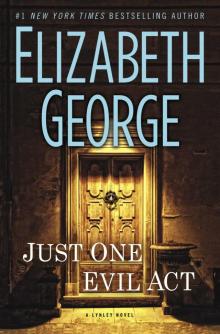 Just One Evil Act
Just One Evil Act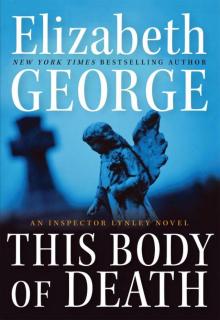 This Body of Death
This Body of Death The Edge of the Water
The Edge of the Water For the Sake of Elena
For the Sake of Elena Believing the Lie
Believing the Lie The Edge of the Shadows
The Edge of the Shadows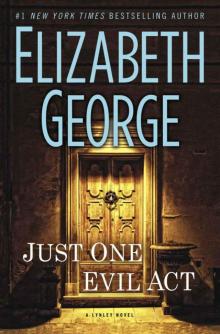 Just One Evil Act: A Lynley Novel
Just One Evil Act: A Lynley Novel In Pursuit of the Proper Sinner
In Pursuit of the Proper Sinner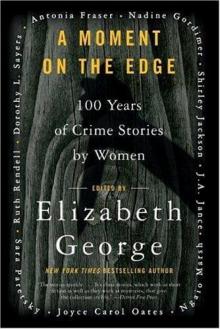 A Moment on the Edge:100 Years of Crime Stories by women
A Moment on the Edge:100 Years of Crime Stories by women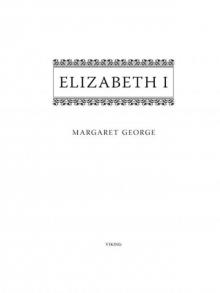 Elizabeth I
Elizabeth I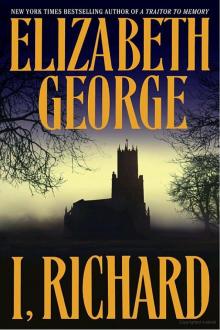 I, Richard
I, Richard A Traitor to Memory
A Traitor to Memory Missing Joseph
Missing Joseph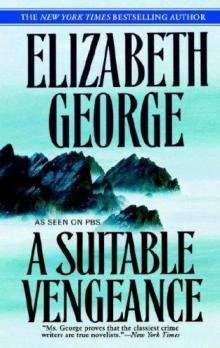 A Suitable Vengeance
A Suitable Vengeance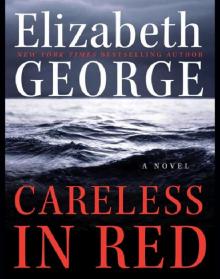 Careless in Red
Careless in Red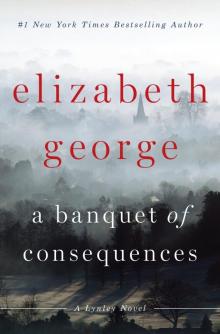 A Banquet of Consequences
A Banquet of Consequences Playing for the Ashes
Playing for the Ashes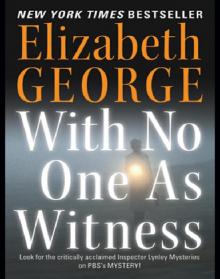 With No One As Witness
With No One As Witness Deception on His Mind
Deception on His Mind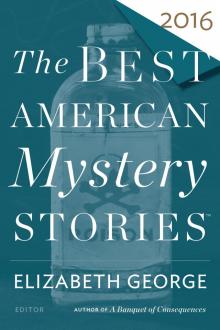 The Best American Mystery Stories 2016
The Best American Mystery Stories 2016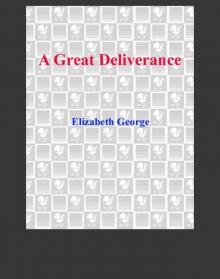 A Great Deliverance
A Great Deliverance In the Presence of the Enemy
In the Presence of the Enemy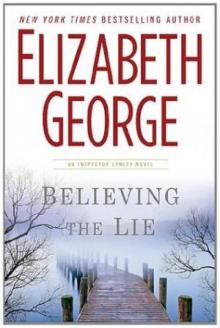 Believing the Lie il-17
Believing the Lie il-17 The Edge of the Light
The Edge of the Light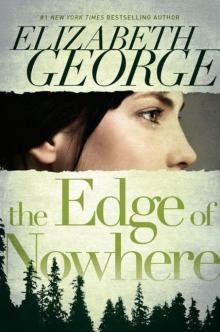 SW01 - The Edge of Nowhere
SW01 - The Edge of Nowhere A Place of Hiding
A Place of Hiding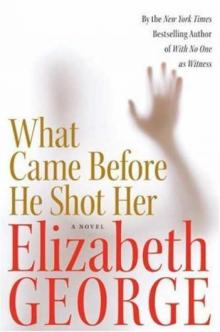 What Came Before He Shot Her il-14
What Came Before He Shot Her il-14 Payment In Blood
Payment In Blood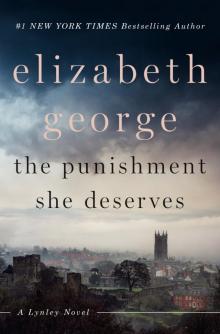 The Punishment She Deserves
The Punishment She Deserves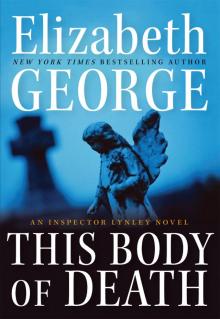 This Body of Death: An Inspector Lynley Novel
This Body of Death: An Inspector Lynley Novel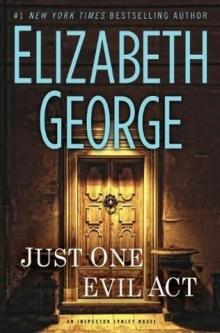 Just One Evil Act il-18
Just One Evil Act il-18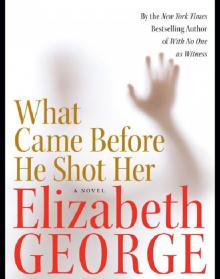 What Came Before He Shot Her
What Came Before He Shot Her Missing Joseph il-6
Missing Joseph il-6